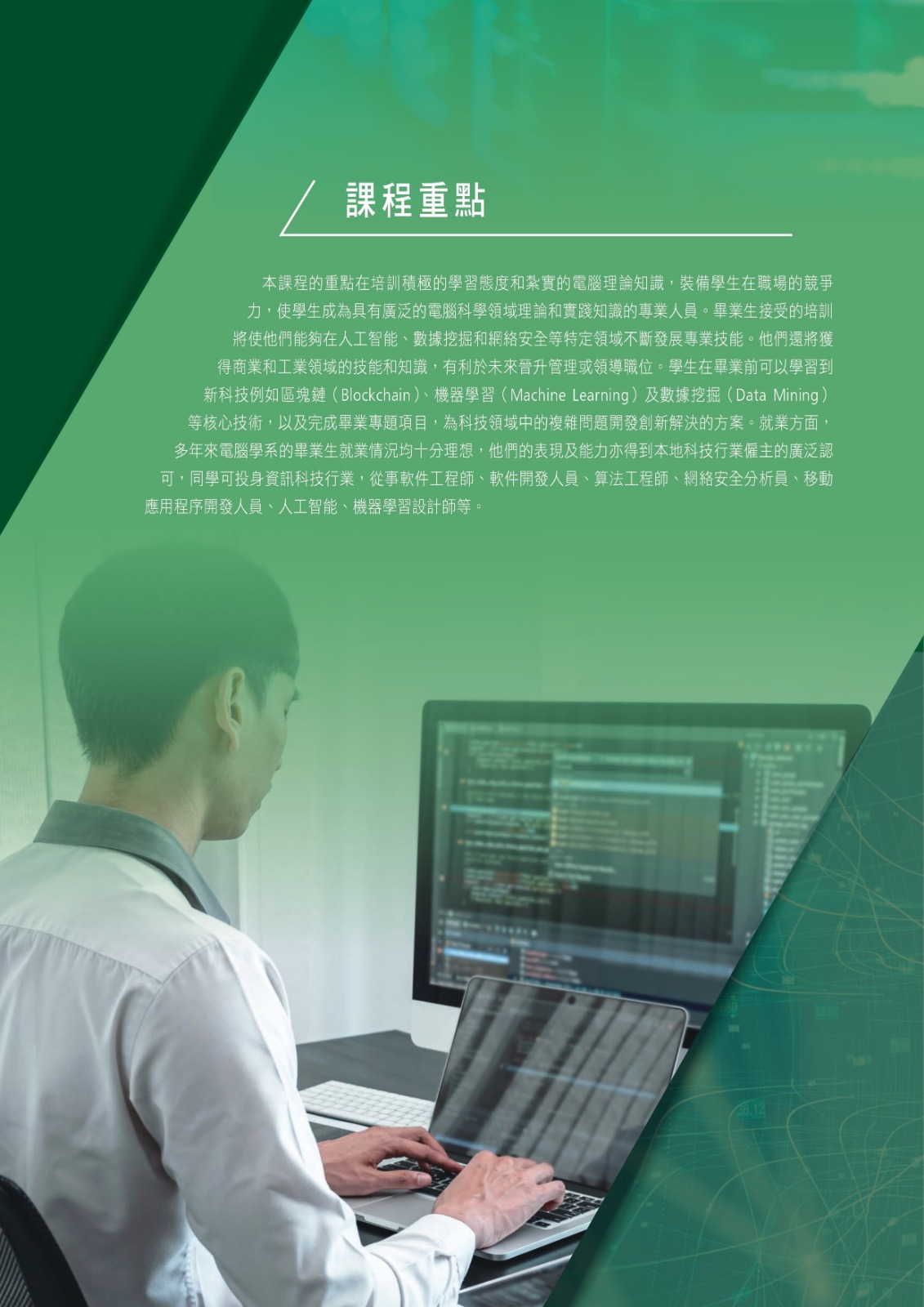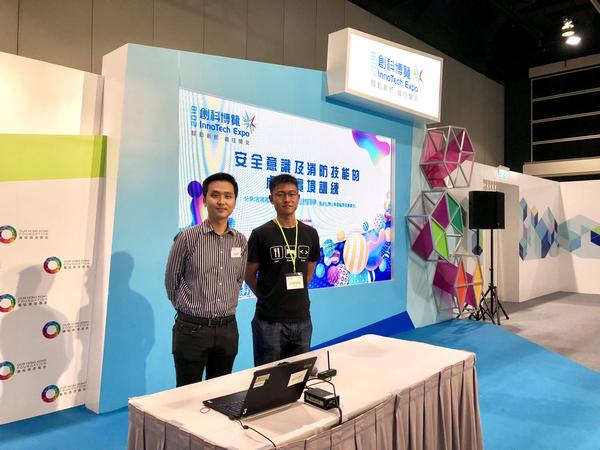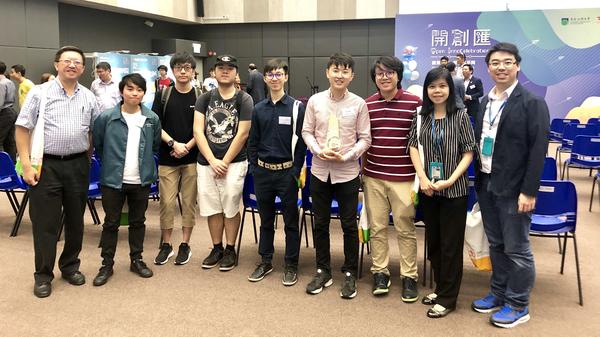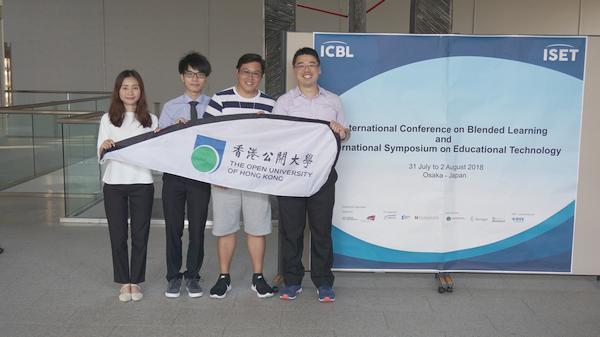Provide advanced training in some of the major pillars in modern computing: processing of information, networking of information, and management of information. Also, expose students to specialized topics related to Internet Technology.
Include programming, software development, software engineering, computing infrastructure, and databases.
| Code |
Title |
Credits |
Course Level |
Honours Classification |
| COMP 4210SEF |
Advanced Database and Data Warehousing |
3 |
Higher |
– |
|
As a sequel to COMP 3200SEF, this course aims to provide students with more advanced concepts of relational databases and more practical experience in different situations.
Students will study more advanced concepts and theories about relational databases. Major topics include Entity-Relation model, normalization, transaction management, and other advanced topics.
|
|
Advisory Pre-requisites: Students should have completed most foundation and middle level computing courses.
|
| Code |
Title |
Credits |
Course Level |
Honours Classification |
| COMP 4330SEF |
Advanced Programming and AI Algorithm |
3 |
Higher |
– |
|
This course aims to introduce basic concepts and algorithms of artificial intelligence (AI) and to facilitate students to develop advanced programming skills to tackle sophisticated problems, especially using AI algorithms and techniques.
Students will be able to explain the capabilities, strengths and limitations of various AI techniques, as well as AI algorithms and their applications. Students also learn how to apply AI algorithms and programming methods to solve real world problems, and write programs to implement the devised algorithmic solutions. |
| Code |
Title |
Credits |
Course Level |
Honours Classification |
| COMP 4620SEF |
Concurrent and Networks Programming |
3 |
Higher |
– |
|
This course develops in students' ability to write programs that can run on computer networks. Students will improve their productivity as network programmers by learning programming frameworks and advanced programming language features.
The topics may include basic networking concepts, multi-threaded programming, web services, regular expressions, recursion, Lambda expression, map/reduce paradigm, aspect-oriented programming, message queues, etc. |
| Advisory Pre-requisites: Students should have completed most foundation, middle and higher level computing courses. |
| Code |
Title |
Credits |
Course Level |
Honours Classification |
| COMP 4630SEF |
Distributed Systems and Parallel Computing |
3 |
Higher |
– |
|
The aim of this course is to develop in students' knowledge and skills in the development of distributed systems and parallel programs. It covers major parallel programming approaches and describes how to model parallel programs with various tools. It also takes students through case studies such as web services and Hadoop.
The topics may include distributed systems concepts, Erlang programming language and its Open Telecom Platform (OTP), hot code swapping, Hadoop and MapReduce, unconventional DB, Petri nets, clock synchronization, global state detection and election algorithms. |
| Pre-requisites: Students are expected to have completed three semester courses or more using any programming languages. Students are recommended to have taken COMP 4620SEF (Concurrent and Network Programming) though motivated individuals without 4620SEF will still be able to handle this course. |
| Code |
Title |
Credits |
Course Level |
Honours Classification |
| COMP 4820SEF |
Data Mining and Analytics |
3 |
Higher |
– |
|
This course introduces the key concepts, techniques and tools that would allow hidden patterns of data to be uncovered. Key topics of this course include: data warehousing, the data mining process, classification, regression, clustering and association mining.
Students will learn how to apply this knowledge to solving typical data mining problems through case studies of real-world applications of data mining techniques.
The topics may include data mining and data warehousing concepts, data mining process and software, classification and regression methods, clustering algorithms, and association rule mining. |
| Advisory Pre-requisites: Students should have completed most foundation, middle and higher level computing courses. |
| Code |
Title |
Credits |
Course Level |
Honours Classification |
| COMP 4900SEFF |
Creative Programming for Games |
3 |
Higher |
– |
|
This course aims to develop the students' capabilities in applying programming skills to develop serious games and creative applications. The course consists of three parts.
The first part will teach students how to generate interactive and algorithmic graphics using a game engine. The second part discusses various theories and issues in designing a serious game. The third part introduces various technologies and techniques for enhancing the user experience, which includes using sensors to orient a device in physical space and to interact with game objects.
The course will enable students to design and develop serious games and creative applications with an appropriate integration of programming skills and techniques. |
| Code |
Title |
Credits |
Course Level |
Honours Classification |
| COMP 4930SEFF |
Deep Learning |
3 |
Higher |
– |
|
This course aims to develop the students’ capabilities in Deep Learning.
|
| Code |
Title |
Credits |
Course Level |
Honours Classification |
| ELEC 3050SEF |
Computer Networking |
3 |
Higher |
– |
|
This course aims to introduce the concepts and fundamental design principles of modern computer networking in a top-down approach, focusing on the Internet's architecture and protocols. The lecture begins at the application layer and working its way down toward the data link layer of the computer network reference model.
The topics may include delay and loss in packet switched networks, protocol layered architecture, application layer HTTP, transport layer TCP, UDP, network layer routing, addressing, link layer switching, multiple access protocols, MAC addresses and Ethernet. |
| Advisory Pre-requisites: Students should have completed most foundation, middle and higher level computing courses. |
| Code |
Title |
Credits |
Course Level |
Honours Classification |
| ELEC 3470SEF |
Multimedia Technologies |
3 |
Higher |
– |
|
This course aims to introduce the concepts of Multimedia Technologies.
|
| Code |
Title |
Credits |
Course Level |
Honours Classification |
| ELEC 4310SEF |
Blockchain Technologies |
3 |
Higher |
– |
|
This course introduces the concepts and applications of blockchain technologies, explains their potential impacts on different industries, and explores the latest techniques of permissionless and permissioned blockchains. Students will learn practical development skills in the two popular blockchain platforms (Ethereum and Hyperledger fabric) to understand blockchain programming and application development.
|
| Code |
Title |
Credits |
Course Level |
Honours Classification |
| ELEC 4480SEF |
IOT Security |
3 |
Higher |
– |
|
This course aims to introduce students to the concepts of discovering vulnerability, risk assessments, researching in and recommending risk mitigation strategies for common security threats in Internet of Things (IoT) systems. Students will be able to use industry-standard models to explain security requirements in IoT systems, and IoT security risks in an industry sector.
Students will also learn to evaluate physical device / communication / application security vulnerabilities in IoT systems, and design threat mitigation measures based on threat modeling and risk management frameworks.
Topics include IoT Security Challenges, IoT systems and architectures, IoT Device Layer Attack, Communication Layer Attack, Application Layer Attack, vulnerability and risk assessment in an IoT System. |
| Code |
Title |
Credits |
Course Level |
Honours Classification |
| ELEC 4710SEF |
Digital Forensics |
3 |
Higher |
– |
|
This course will cover the fundamentals of computer forensics and investigations. Topics include historical and current digital forensics; a systematic approach to computer investigations; digital forensics, email and image file analysis; and guidelines for writing digital forensics reports. Various forensic tools will be used during the laboratory sessions of the course.
|
|
Advisory Pre-requisites: Students should have completed most foundation, middle and higher level computing courses and should have a solid knowledge in networking or have completed ELEC 3050SEF.
|
| Code |
Title |
Credits |
Course Level |
Honours Classification |
| COMP 4950SEF |
Professional Placement |
3 |
Higher |
– |
|
|



















